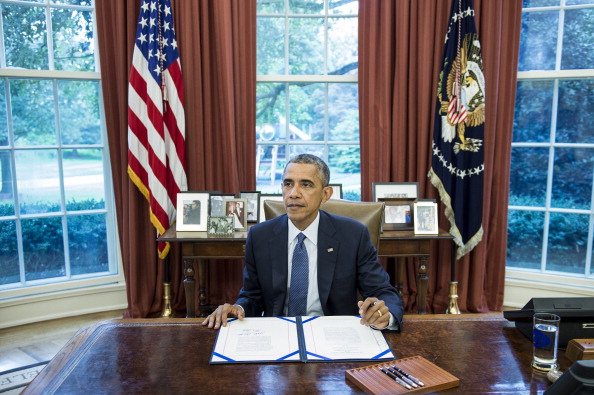
President Barack Obama issued an executive order imposing sanctions against former President Djotodia on May 13, 2014 (Photo credit: Brendan Smialowski/AFP/Getty Images).
This blog posting is part of a series Amnesty USA is publishing to coincide with the U.S.-Africa Summit occurring August 4-6th, 2014. We are utilizing the series to highlight human rights concerns on the continent we feel critically need to be addressed during the summit discussions.
Contributed by Natalia Taylor Bowdoin, Amnesty International USA Country Specialist on the Central African Republic
It is critical leaders in the U.S. and the West African nation of Benin address international justice issues at the U.S.-Africa Leaders Summit. Former Central African Republic (CAR) President, Michel Djotodia, currently living in exile in Benin, must be investigated for the crimes under international law committed under his command and prosecuted if there is sufficient evidence to bring a case against him.
Peace and reconciliation for CAR is only possible when there are no safe havens for perpetrators of war crimes and crimes against humanity.
Leaders of nations, where Séléka or Anti-balaka members are currently in exile, have a moral obligation to exercise universal jurisdiction over all crimes under international law. Further, where allegations relate to grave breaches of the Geneva Conventions and of Protocol I, to torture and to the crime of enforced disappearance, they have an obligation to investigate and prosecute them in their domestic courts or to extradite the suspects so they can face justice.
Your voice is vital to urge U.S. President Barack Obama and President of Benin Yayi Boni to make this investigation happen.
The entire population of the CAR, approximately 4.6 million, have been impacted by the violent conflict which began in December 2012 and has threatened to rip the country in two. Today, more than a million people have been displaced either inside or outside the country and over half the population are in need of humanitarian assistance. The magnitude of the crisis has had a devastating impact on the entire region.
Former President and Séléka armed opposition leader, Michel Djotodia, resigned under pressure from regional leaders and former colonial power, France, over his failure to curb the conflict. The conflict had increasingly been marked by horrific reprisal attacks against civilians carried out by Séléka and Anti-balaka militia groups throughout the country and along predominantly ethno-religious lines.
The violence reached a pinnacle in the capital, Bangui, on December 5 and 6, 2013. During that time, Amnesty International documented the attacks that resulted in 800 to 1200 deaths and war crimes and crimes against humanity committed by members of both sides of the conflict. Recent peace talks between Séléka, Anti-balaka and other armed groups have resulted in a cease- fire signed on July 23. However, the situation remains highly volatile and precarious.
Leaders from both groups have been implicated by the United States government and the United Nations in inflaming the violence in the CAR and several Séléka and Anti-balaka leaders had sanctions levied against them. On May 13, 2014, President Barack Obama issued an executive order imposing sanctions against former President Djotodia together with four other CAR nationals from both sides of the conflict.
Despite his exile in Benin, Djotodia remains involved with Séléka commanders present in Bangui and the north-east. While recent peace talks and a cease-fire agreement seemed a hopeful sign for the people of the CAR, the healing and reconciliation necessary for the country to truly recover from this grave human rights and humanitarian crisis can only happen against a backdrop of accountability and justice.
The CAR needs the world’s support, now more than ever. The Summit provides a unique opportunity for engaging with critical justice and accountability issues such as these. And most importantly, the White House and the State Department should take the opportunity this Summit provides to stress accountability to counterparts in Benin and elsewhere who have an important role to play in helping to bring about this vital step toward justice.
Peace and reconciliation for CAR is only possible when there are no safe havens for perpetrators of war crimes and crimes against humanity.
Benin and the U.S. must ensure that perpetrators of the violence in the CAR are not allowed diplomatic immunity from investigation, prosecution and punishment should there be enough evidence for conviction. Please take a moment to let President Yayi Boni of Benin, President Barack Obama and Secretary Kerry hear your voice on this important human rights issue.
Thank you for continuing to shine a light on the tragedy in the Central African Republic that is so often forgotten or overlooked.